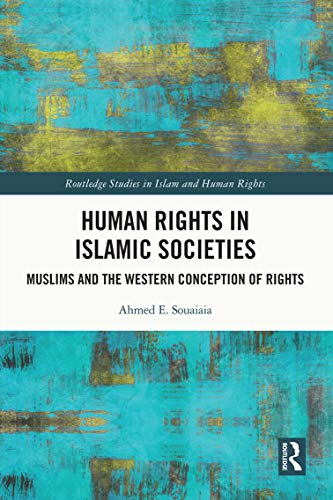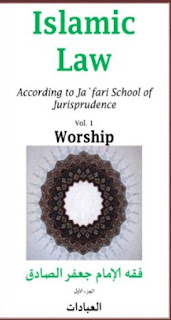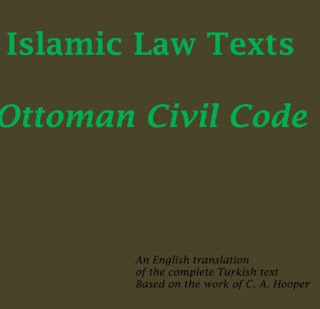MAXIMS OF ISLAMIC JURISPRUDENCE
PART II
Article 2. A matter is determined according to intention; that is to say, the effect to be given to any particular transaction must conform to the object of such transaction.
Article 3. In contracts effect is given to intention and meaning and not to words and phrases. Consequently, a contract for sale subject to a right of redemption has the force of a pledge.
Article 4. Certainty is not dispelled by doubt.
Article 5. It is a fundamental principle that a thing shall remain as it was originally.
Article 6. Things which have been in existence from time immemorial shall be left as they were.
Article 7. Injury cannot exist from time immemorial.
Article 8. Freedom from liability Is a fundamental principle.
Therefore, if one person destroys the property of another, and a dispute arises as to the amount thereof, the statement of the person causing such destruction shall be heard, and the onus of proof as to any amount in excess thereof is upon the owner of such property.
Article 9. Non-existence is a fundamental principle which applies to all rights which may subsequently accrue.
Example:-
In a case of partnership of capital and labor, a dispute arises as to whether profit has been made or not. The statement of the person supplying the labor is heard, and the owner of the capital must prove that profit has in fact been made, since the fundamental principle is the non-existence of the profit.
Article 10. Judgment shall be given in respect to any matter which has been proved at any particular time, unless the contrary is proved.
Consequently, if it is proved at any particular time that a particular thing is owned by a particular person in absolute ownership, the ownership thereof shall be held to be valid unless circumstances arise which invalidate such ownership.
Article 11. It is a fundamental principle that any new occurrence shall be regarded as happening at the time nearest to the present. That is to say, if a dispute arises regarding the cause of some new event and the time at which it occurred, such event shall be considered with reference to the time nearest to the present, unless it is proved that it relates to some remoter period.
Article 12. It is a fundamental principle that words shall be construed literally.
Article 13. No attention shall be paid to inferences in the face of obvious facts.
Article 14. Where the text is clear, there is no room for interpretation.
Article 15. A matter which has been proved contrary to legal analogy cannot be cited by way of analogy in respect to any other matter.
Article 16. One legal interpretation does not destroy another.
Article 17. Difficulty begets facility; that is to say, difficulty is the cause of facility and in time of hardship consideration must be shown. Very many subjects of Islamic jurisprudence, such as loans, transfer of debts and interdiction are derived from this principle, and the latitude and indulgence shown by Islamic jurists in their rulings are all based upon this rule.
Article 18. Latitude should be afforded in the case of difficulty, that is to say, upon the appearance of hardship in any particular matter, latitude and indulgence must be shown.
Article 19. Injury may not be met by injury.
Article 20. Injury is removed.
Article 21. Necessity renders prohibited things permissible.
Article 22. Necessity is estimated by the extent thereof.
Article 23. A thing which is permissible by reason of the existence of some excuse therefore, ceases to be permissible with the disappearance of that excuse.
Article 24. When a prohibition is removed, the thing to which such prohibition attaches reverts to its former status of legality.
Article 25. An injury cannot be removed by the commission of a similar injury.
Article 26. A private injury is tolerated in order to ward off a public injury. The prohibition from practice of an incompetent physician is derived from this principle.
Article 27. Severe injury is removed by lesser injury.
Article 28. In the presence of two evils, the greater is avoided by the commission of the lesser.
Article 29. The lesser of two evils is preferred.
Article 30. Repelling an evil is preferable to securing a benefit.
Article 31. Injury is removed as far as possible.
Article 32. Any want, whether of a public or private nature, is so dealt with as to meet the exigencies of the case. The validity of sale subject to a right of redemption is of this nature. The inhabitants of Bokhara having fallen badly into debt, this procedure was put into operation in order to meet the exigencies of the case.
Article 33. Necessity does not invalidate the right of another. Consequently, if a hungry person eats bread belonging to another, such person must later pay the value thereof.
Article 34. A thing which may not be taken may also not be given.
Article 35. It is forbidden to request the performance of a prohibited act.
Article 36. Custom is an arbitrator; that is to say, custom, whether public or private, may be invoked to justify the giving of judgment.
Article 37. Public usage is conclusive evidence and action must be taken in accordance therewith.
Article 38. A thing which it is customary to regard as impossible is considered to be impossible in fact.
Article 39. It is an accepted tact that the terms of law vary with the change in the times.
Article 40. In the presence of custom no regard is paid to the literal meaning of a thing.
Article 41. Effect is only given to custom where it is of regular occurrence or when universally prevailing.
Article 42. Effect is given to what is of common occurrence; not to what happens infrequently.
Article 43. A matter recognized by custom is regarded as though it were a contractual obligation.
Article 44. A matter recognized by merchants is regarded as being a contractual obligation between them.
Article 45. A matter established by custom is like a matter established by law.
Article 46. When prohibition and necessity conflict, preference is given to the prohibition. Consequently, a person may not sell to another a thing which he has given to his creditor as security for debt.
Article 47. An accessory which is attached to an object in fact is also attached to it in law.
Consequently, when a pregnant animal is sold, the young in its womb is sold with it.
Article 48. An accessory to an object cannot be dealt with separately.
Example:
The young in an animal’s womb cannot be sold separately.
Article 49. The owner of a thing held in absolute ownership is also the owner of the things indispensable to the enjoyment of such thing.
Example:
A person who buys a house is also owner of the road leading to it.
Article 50. If the principal fails, the accessory also fails.
Article 51. A thing which fails is not restored; that is to say, that which goes does not return.
Article 52. When a thing becomes void, the thing contained in it also becomes void.
Article 53. When the’ original undertaking cannot be carried out, the equivalent thereof is carried out.
Article 54. A thing which is not permissible in itself, may be permissible as an accessory.
Example:-
It is not permissible for a purchaser to make the vendor his agent to receive the thing sold; but if he gives a sack to the vendor to measure and put therein the provisions which he has bought and the vendor puts the provisions into the sack, the purchaser thereby receives them impliedly and as an accessory.
Article 55. A thing which is not permissible at the outset may become permissible at some later period.
Example:-
The disposal of a share of undivided jointly owned property by way of gift is invalid, but if a person entitled to a share of undivided jointly owned property which has been bestowed by way of gift appears and takes possession thereof, the gift does not become void, but the remaining share becomes the property of the recipient of the gift.
Article 56. Continuance is easier than commencement.
Article 57. A gift becomes absolute only when delivery thereof is taken.
Example:-
A person bestows a thing upon another person by way of gift. Such gift is not binding until delivery thereof has been taken.
Article 58. The exercise of control over subjects is dependent upon the public welfare.
Article 59. Private guardianship is more effective than public guardianship.
Example:-
The guardianship exercised by the trustee of a pious foundation is more effective than the guardianship of the Court.
Article 60. A word should be construed as having some meaning, rather than passed over in silence. That is to say, if any particular meaning can be attributed to a word, it may not be passed over as devoid of meaning.
Article 61. When the literal meaning cannot be applied, the metaphorical sense may be used.
Article 62. If no meaning can be attached to a word it is disregarded altogether. That is to say, if a word cannot be construed in either a literal or metaphorical sense it is passed over in silence as being devoid of meaning.
Article 63. A reference to part of an indivisible thing is regarded as a reference to the whole.
Article 64. The absolute is construed in its’ absolute sense, provided that there is no proof of a restricted meaning either in the text of the law or by implication.
Article 65. A description with reference to a thing present is of no effect, but the contrary is the case if such thing is not present.
Example :When a vendor who is about to sell a grey horse, such grey horse being present at the meeting where the sale took place, states that he is selling a brown horse for so many thousand piastres, his offer is held to be good and the word brown is of no effect. But if he sells a grey horse which is not present and he describes it as brown, the description is held to be good but the sale is not concluded.
Article 66. A question is considered to have been repeated in the answer. That is to say, in the event of a question being answered in the affirmative, the person answering the question is considered to have repeated the question.
Article 67. No statement is imputed to a man who keeps silence, but silence is tantamount to a statement where there is an absolute necessity for speech. That is to say, it may not be said that a person who keeps silence has made such and such a statement, but if he keeps silence where he ought to have made a statement, such silence is regarded as an admission and a statement.
Article 68. In obscure matters the proof of a thing stands in the place of such thing. That is to say, obscure matters concerning which it is hard to discover the truth are judged according to the obvious proof concerning them,
Article 69. Correspondence takes the place of an exchange of conversation.
Article 70. The signs of a dumb person which are generally recognized take the place of a statement by word of mouth.
Article 71. The word of an interpreter is accepted in every respect.
Article 72. No validity is attached to conjecture which is obviously tainted by error.
Article 73. Probability, even though based upon evidence, is not proof.
Example:-
If a person admits while suffering from a mortal sickness that he owes a certain sum of money to one of his heirs, such admission is not proof unless confirmed by the other heirs, since the probability of such person defrauding the other heirs of their property is based upon the mortal sickness. If the statement, however, is made while in a state of good health, such admission is considered to be valid. The probability in that case is mere supposition and consequently there is no objection to the validity of the admission.
Article 74. No weight is attached to mere supposition.
Article 75. A thing established by proof is equivalent to a thing established by ocular inspection.
Article 76. Evidence is for him who affirms; the oath for him who denies.
Article 77. The object of evidence is to prove what is contrary to appearance; the object of the oath is to ensure the continuance of the original state.
Article 78. Evidence is proof affecting third persons; admission is proof affecting the person making such admission only.
Article 79. A person is bound by his own admission
Article 80. Contradiction and proof are incompatible; but this does not invalidate a judgment given against the person contradicting
Example:-
Witnesses contradict themselves by going back upon the evidence they have given. Such evidence is not proof; but if the Court has already given judgment based upon the original evidence, such judgment may not be set aside, but the witnesses must pay the value of the subject matter of the judgment to the persons against whom judgment has been given.
Article 81. Failure to establish the principal claim does not imply failure to establish a claim subsidiary thereto.
Example:-
A person states that A owes a sum of money to B and that he is the surety of A. Such person will be obliged to pay the sum in question if A repudiates the debt and B demands payment.
Article 82. If the validity of a condition is established, the validity of anything dependent thereon must also be established.
Article 83. A condition must be observed as far as possible.
Article 84. Any promise dependent upon a condition is irrevocable upon such condition being fulfilled.
Example:-
A person tells A to sell a certain thing to B and informs A that he will pay him in the event of B failing to do so, and B does in fact fail so to do. The person making the promise is obliged to pay the money.
Article 85. The enjoyment of a thing is the compensating factor for any liability attaching thereto; that is to say, in the event of a thing being destroyed, the person to whom such thing belongs must suffer the loss and conversely may enjoy any advantages attaching thereto.
Example:
An animal is returned by reason of an option for defect. The vendor may not charge any fee on account of the use of the animal, because if it had been destroyed before being returned, the loss would have fallen upon the purchaser.
Article 86. Remuneration and liability to make good loss do not run together.
Article 87. Disadvantage is an obligation accompanying enjoyment. That is to say, a person who enjoys a thing must submit to the disadvantages attaching thereto.
Article 88. The burden is in proportion to the benefit and the benefit to the burden.
Article 89. The responsibility for an act falls upon the author thereof; it does not fall upon the person ordering such act to be performed, provided that such person does not compel the commission thereof.
Article 90. If a person performs any act personally and is implicated therein with the person who is the cause thereof, the person performing such act is responsible therefore.
Example:-
A digs a well in the public highway and B causes C’s animal to fall therein and to be destroyed. B is responsible therefore and no liability rests with the person-who dug the wells
Article 91. An act allowed by law cannot be made the subject of a claim to compensation.
Example :
An animal belonging to A falls into a well which B has dug on his own property held in absolute ownership and such animal is destroyed. No compensation can be claimed.
Article 92. A person who performs an act, even though not intentionally, is liable to make good any loss caused thereby.
Article 93. A person who is the cause of an act being performed is not liable to make good any loss caused by such act unless he has acted intentionally.
Article 94. No liability attaches in connection with offences of or damage caused by animals of their own accord.
Article 95. Any order given for dealing with the property of any other person held in absolute ownership is void.
Article 96. No person may deal with the property of another held in absolute ownership without such person’s permission.
Article 97. No person may take another person’s property without some legal reason.
Article 98. Any change in the cause of the ownership of a thing held in absolute ownership is equivalent to a change in that thing itself.
Article 99. Any person who hastens the accomplishment of a thing before its due time, is punished by being deprived thereof.
Article 100. If any person seeks to disavow any act performed by himself, such attempt is entirely disregarded.





0 comments:
Post a Comment